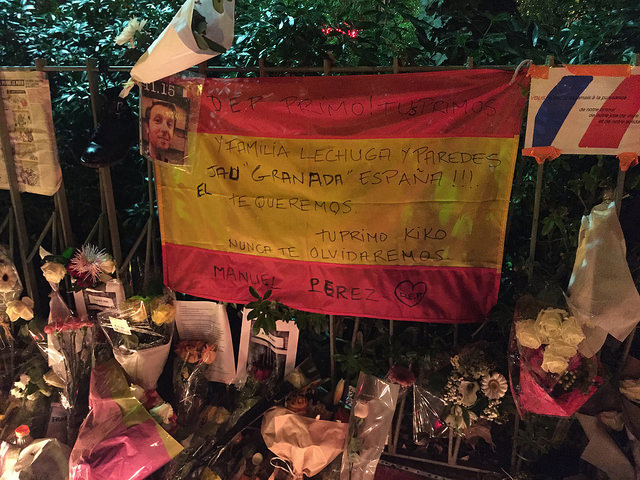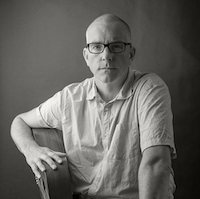I finally got a chance to visit the Bataclan with my wife and six-year-old daughter, on December 13th, 2015—exactly a month after the Paris attacks.
It’s not far from my old neighbourhood, where I met my wife and began many and sundry life adventures.
I could feel a slight trembling as we neared 50 rue Voltaire.
The inside of the Bataclan was cordoned off and still blocked from view, except for the brightly colored facade. The three of us wandered down the infamous side street where the world saw videos of people running helter-skelter in scenes of horror: a pregnant woman trying to escape from a high window, a man dragging a body down the street, and other nameless horrors.
My wife started to weep a little.
With the guileless curiosity of a child, my daughter asked me, “Why did they come here to kill people?”
I didn’t have an answer.
When faced with the unspeakable, we enter a dimension of silence, and a kind of spontaneous meditation occurs. We become more aware of sound, colors, of the sky — the outline of things. It’s like a portal opens to the beyond. In contemplating the dead, we are acutely present with the living, the pulse of our existence becomes all the more present and alive.
This little side street was the most poignant to me. What struck me most were the bulletholes still smattered all over the place. Some of them were circled with chalk and numbered for police reasons. People had made many offerings: there were lots of rotting flowers everywhere, gilded pictures of the fallen, and lots of shaky childlike drawings.
The sky was overcast and heavy, but I still felt something bright in the air. It was if, after so much death, souls were being reconstituted into light. Of course these are just my projections, all-too-human attempts to make a narrative out of what has no boundaries or sense.
I’m a teacher, and throughout the month, many of my students have been having panic attacks. How to speak about the unspeakable, to meditate on what seems beyond sense with them? How do I talk about this with my young students, let alone my six-year-old daughter? When bad things happen, in your town, in your local world, there is a collective trauma that needs to be negotiated.
We could take the coward’s approach and talk of revenge, but we become cowards when, not knowing how to register certain things, we dramatize them and lash out at the world. Of course, it is certainly understandable to want to bomb the hell out of whoever is responsible for these attacks—and yet we sow the seeds for further carnage in that way, obviously—or is that not obvious to us yet, after so many trillion dollar wars?
This is how the terrorist wins—though our own violence and despair.
What to do then? According to Tibetan meditation master Chogyam Trungpa, a true warrior experiences the genuine heart of sadness—in other words, the mark of a true hero is the ability to remain present in both the sadness and the beauty of the world. Touching into that heartbreak keeps us from turning to violence or cynicism, and allows us to learn of the intelligence of our hearts.
It seems to me that what is really needed is this tender silence. Let the politicians make speeches, galvanized patriotism, and plan their counterattack — that goes with their territory.
I only want to be present with what happens here, to silently contemplate this tragedy.
One should remember that this sort of thing could happen to anybody at any time. Our lives are so fragile, that a hard wind or a big wave could just as easily come along as a bullet and end our earthly adventures pretty quickly.
That is why perennial wisdom has always said: “keep death near” and entreated us to be aware of the impermanence of life. The grim reaper is already very near in any case: he exists in our very body, in a cancerous cell, for instance. Life is so very brief and Mr. Death can come and visit at any time, leaving us empty handed and bereft.
Will we be violently torn from life or gladly go into the beyond, having had a full life and fulfilled our birthright and promise? It may be dependent on agency or fate: if we are in the wrong place at the wrong time, then we might just meet a bullet with our name — or a falling tree branch for that matter.
What can we do but acknowledge the beauty and gravity of this moment? And the next.
Author: Andrew Sweeny
Image: ERIC SALARD at Flickr
Editor: Renée Picard / Apprentice editor: Aga Wyrzykowska







Read 0 comments and reply